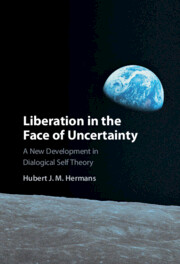Book contents
- Liberation in the Face of Uncertainty
- Liberation in the Face of Uncertainty
- Copyright page
- Dedication
- Contents
- Figures
- Tables
- Preface
- Acknowledgments
- Introduction
- Chapter 1 Playing with Plato
- Chapter 2 Centralization and Decentralization of the Self
- Chapter 3 The Other as Heaven and Hell
- Chapter 4 Re-enchantment of the World
- Chapter 5 Imprisonment and Liberation of the Self
- Chapter 6 Uncertainty in the Self
- Chapter 7 Multiple Well-Being and Other-Inclusive Happiness
- Glossary
- References
- Index
Chapter 3 - The Other as Heaven and Hell
The Positional Basis of Dialogue
Published online by Cambridge University Press: 06 January 2022
- Liberation in the Face of Uncertainty
- Liberation in the Face of Uncertainty
- Copyright page
- Dedication
- Contents
- Figures
- Tables
- Preface
- Acknowledgments
- Introduction
- Chapter 1 Playing with Plato
- Chapter 2 Centralization and Decentralization of the Self
- Chapter 3 The Other as Heaven and Hell
- Chapter 4 Re-enchantment of the World
- Chapter 5 Imprisonment and Liberation of the Self
- Chapter 6 Uncertainty in the Self
- Chapter 7 Multiple Well-Being and Other-Inclusive Happiness
- Glossary
- References
- Index
Summary
Sartre’s play No Exit is described in order to demonstrate the nature of imprisonment that results from looking at oneself via the mirrors of social judgment. In a similar vein, the “male gaze” is analyzed as the imprisoning reduction of the female body as an it-position in the service of the pleasure of the male viewer. This is followed by a discourse about racial discrimination in which the powerful and discriminating other is not simply an “objective” reality outside the self but an organizing part of it. Furthermore, it is argued that positions are not always fixed but, under specific circumstances, flexible as exemplified by a series of psychological experiments investigating the so-called rubber hand illusion. The flexibility of positioning and repositioning is further explained by the story of James Griffin who changed his skin color from white to black. Finally, the dialogical self is described as inherently social, spatial, temporal, and historical.
Keywords
- Type
- Chapter
- Information
- Liberation in the Face of UncertaintyA New Development in Dialogical Self Theory, pp. 72 - 118Publisher: Cambridge University PressPrint publication year: 2022
- 1
- Cited by

